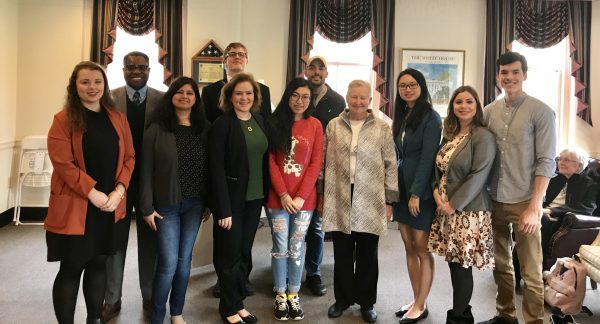
Ambassador Nancy Powell
On February 15th Ambassador Nancy Powell came to visit at Seton Hall University. She gave a talk, which the Office of Internships and Career Development and the Office of Professional Services of Seton Hall School of Diplomacy hosted as a career talk with Ambassador Nancy Powell.
Nancy Powell started her career as a schoolteacher in rural Iowa. After a tour of Pakistan, she knew that she wanted to explore the world more, which is when she stumbled on the Foreign Service. She luckily passed the test on the first try, and began her career in Canada, then moving on to Nepal. Ambassador Nancy Powell is a career diplomat who served for 37 years in the U.S. Department of State. She served under seven presidents in various roles across Africa and South Asia, including Uganda, Ghana, Pakistan, Nepal, and India.
Ambassador Powell started the talk by giving students general information on how to pursue a career at the U.S. Department of State. She advised students to go on the website Careers Representing America, where the most of the students’ questions could be answered. The website is thorough and updated constantly amongst the 16 careers. On the website, there are detailed descriptions of each career path. The career paths divide the Foreign Service into different categories of positions: civilian positions, consular associate positions, Foreign Service specialists, and Foreign Service generalists. Powell clarified that Seton Hall students will most likely choose the Foreign Service generalist careers. This position is split into political, economic, management, public affairs, and consular positions. Powell was hired as a political affairs generalist, but her first posts were consular positions. Powell spoke on the hierarchy, which exists with these positions. She ordered the importance as political, economic, consular, public affairs, and management as the hierarchy of the positions. Powell lastly pointed out that usually only economic and political officers become Ambassadors. She did say that there are exceptions and that two of her friends are becoming Ambassadors who are career consular officers
She talked about the application process for joining the Foreign Service. The application process starts with a five-hour exam, which takes place three times a year all over the country. The next step is an oral exam, which is an all-day event, taking place in Washington D.C. The oral exam starts with a panel, which assesses what you have to offer to the State Department, then followed with a simulation of a budget proposal with other applicants. This part is to show the State Department how the applicant interacts with other professionals. If the applicant passes this test, they are to complete a security and medical clearance. These clearances can take long periods and are intrusive. Powell stressed the importance of being honest about the security and medical clearances. After these clearances, the applicant is put on a register, which ranks your test scores and your languages. The more points the applicant has the higher they are on the register, which means that that applicant would get picked for a career with the Foreign Service quicker.
Ambassador Powell highlighted the qualities, which the State Department is looking for in their Foreign Service Officers. She focused on two words to describe the qualities they are looking for: learners and leaders. She told the group that they want social skills, flexibility, and adaptability. The stereotype of Foreign Service officers being “pale, male, and Yale”, is no longer relevant. Foreign Service officers are increasingly more diverse in ethnicity and gender. Ambassador Powell also posed the question, “what’s in it for you?” She said that she has been able to explore the world explore the world on the U.S. government’s dollar. The fellow Foreign Service Officers she was able to work with over the years are family members due to how close they became during their service. There are also financial benefits, including a 401 K and a sizeable salary, which has left Ambassador Powell with a nice retirement package. After that, Ambassador Powell opened the floor for questions and answers. The students were enthusiast about having her on campus. At the conclusion of the question and answer portion, the Office of Internships and Career Development and the Office of Professional Services of Seton Hall School of Diplomacy presented the Ambassador with a gift.
This blog post was written by Millicent Womble and Patricia Zanini Graca. Millicent Womble is a junior undergraduate student at the Seton Hall School of Diplomacy and International Relations. Millicent is planning to graduate with a minor in economics and French. Millicent is the United Nations undergraduate Youth Representative to the United Nations for the spring 2018 semester. She is hoping to specialize in economic development in developing nations after she graduates. Patricia is a first-year graduate student at the Seton Hall School of Diplomacy and International Relations. Patricia holds an MBA in Business and Marketing. Patricia is a UN Digital Representative at the Center for UN and Global Governance Studies, a Social Media Associate at the Journal of Diplomacy, and an Associate at the Graduate Diplomacy Council. She specializes in International Organizations and Global Negotiations & Conflict Management.